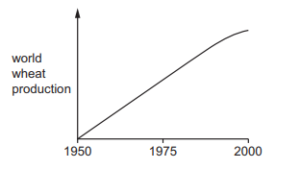Question
What has not increased the world’s food production in the last 100 years?
A artificial selection
B herbicides
C natural selection
D pesticides<
▶️Answer/Explanation
Correct, the answer is C – natural selection.
While artificial selection, herbicides, and pesticides have contributed to increased food production over the last 100 years, natural selection has not played a significant role in directly increasing world food production during this time frame. Natural selection is a process through which certain traits become more common in a population due to their advantageous effects on survival and reproduction. However, in modern agriculture, humans have relied more on artificial selection (selective breeding) and the use of chemicals like herbicides and pesticides to enhance crop yields and control pests, rather than relying on natural selection alone.
Question
The graph shows world wheat production from 1950 to 2000.

What has contributed to the changes shown in wheat production?
A not using herbicides
B not using insecticides
C using selective breeding
D using smaller areas of land
▶️Answer/Explanation
C. using selective breeding
Selective breeding, also known as artificial selection, involves choosing and breeding plants or animals with desirable traits in order to enhance those traits in successive generations. In the context of wheat production, selective breeding plays a significant role in the changes shown in the graph.
Over the years, advancements in agricultural science and technology have allowed researchers and farmers to develop wheat varieties that are more productive, disease-resistant, and adapted to various environmental conditions. These improvements are achieved through careful selection of parent plants with desirable traits and controlled crossbreeding to create new varieties with the desired characteristics.
Selective breeding has led to the development of high-yielding wheat varieties that are more resilient to pests, diseases, and environmental stresses. This has contributed to the increase in wheat production depicted in the graph.
Question
A farmer put some fertiliser on his field. Some of the fertiliser drained into a nearby lake.

What is the effect of the fertiliser on the growth of the crop plants in the field and the plants in the lake?
| crop plant growth | lake plant growth | |
A B C D | decreased decreased increased increased | decreased increased decreased increased |
▶️Answer/Explanation
D
The correct answer is D: increased for crop plant growth and increased for lake plant growth.
Fertilizers contain nutrients that are essential for plant growth, such as nitrogen, phosphorus, and potassium. When the farmer applies fertilizer to the field, it provides the crops with the necessary nutrients, which can lead to increased growth and yield. Therefore, the crop plant growth is likely to increase.
However, when some of the fertilizer drains into the nearby lake, it can have a significant impact on the aquatic ecosystem. The excess nutrients, particularly nitrogen and phosphorus, can cause eutrophication in the lake. Eutrophication is a process in which nutrient levels become excessively high, leading to increased growth of algae and aquatic plants in the lake. This excessive growth can lead to decreased oxygen levels in the water when the algae die and decompose, negatively affecting fish and other aquatic organisms.
So, the plants in the lake are likely to experience increased growth due to the influx of nutrients from the fertilizer, but this growth is often accompanied by negative consequences for the overall health of the lake ecosystem.
